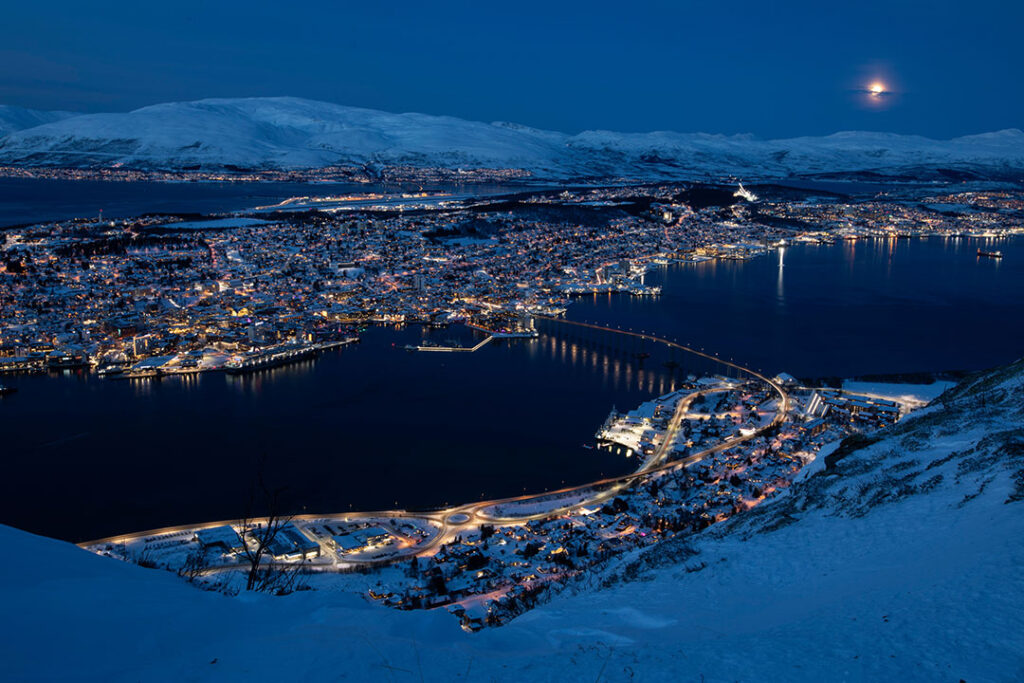The Norwegian city of Tromsø is north of the Arctic Circle and one of the centers of global Arctic studies. REUTERS
THE WATCH
The United States and its fellow Western Arctic nations remain committed to the Arctic Council despite concerns raised by Russia’s recent decision to suspend its annual financial contribution to the intergovernmental forum. When Russia, which at the time was Arctic Council chair, invaded Ukraine on February 24, 2022, the other seven member states — Canada, Denmark, Finland, Iceland, Norway, Sweden and the U.S. — paused their council participation. The Arctic Council was created in 1996 as a forum for those nations with Arctic territory and the region’s Indigenous people to cooperate on issues such as sustainable development and environmental protection. Norway is the current council chair, which rotates every two years.
“It is and remains the most important forum for cooperation on these matters,” Norwegian Prime Minister Jonas Gahr Støre said on January 31, 2024, during a speech at the Arctic Frontiers conference in the Norwegian city of Tromsø, which is home to the Arctic Council Secretariat (ASC) that manages the forum’s administrative duties. Støre’s comment echoes those of a joint statement released on June 8, 2022, when the council’s member nations announced a limited resumption of work on projects that did not involve Russian participation: “We remain convinced of the enduring value of the Arctic Council for circumpolar cooperation and reiterate our support for this forum and its important work.” That work includes providing a forum for Arctic nations and other stakeholders to address climate change and other pressing issues in the region, where melting sea ice is opening the region to new shipping routes and the extraction of natural resources.
Moscow said its decision on payments will remain in place until “real work” resumes with the participation of all member countries, the RIA state news agency reported, according to a February 14, 2024, Reuters story. In 2023, all the Arctic countries agreed on guidelines to resume activities of the working and expert groups, which shoulder the council’s main work. Marc Nathanson, the U.S. ambassador to Norway, emphasized Washington’s strong belief in the council’s work. “The Arctic Council must survive,” Nathanson told Reuters in an October 27, 2023 report on the opening in Tromsø of the northernmost U.S. diplomatic station. U.S. Secretary of State Antony Blinken likened having the station to a “diplomatic footprint above the Arctic Circle,” according to Reuters. Tromsø, the largest city in Arctic Norway, is 400 kilometers west of bordering Russia, according to Reuters. The U.S. station is in the same building as the ACS.
Despite unified support for the Arctic Council, some observers have questioned the forum’s viability without the participation of Russia, which accounts for an estimated 45% of the Arctic’s geography. One expert, however, cautions against overstating such concerns. “There is no core Arctic Council funding for the many assessments, toolkits, analyses, events and other products that have been delivered by the council over the last 25-plus years,” wrote Dr. Jennifer Spence in a February 15, 2024, opinion piece in High North News, an independent newspaper published by the High North Center at the Nord university. “This lack of core funding to support the Council’s priorities has been a … topic of much debate over the years, but in this instance, it means that the council’s ability to function is not dependent on the financial contributions of any one Arctic state,” noted Spence, the Arctic Initiative senior fellow at the Harvard Kennedy School’s Belfer Center for Science and International Affairs.
Morten Høglund, chair of the Senior Arctic Officials in the Arctic Council during Norway’s leadership, told High North News on February 20, 2023 that Moscow, specifically, is halting its co-funding of the ACS. Spence called that a crucial distinction. “While the ACS will certainly have to make some adjustment because of this reduction in funding,” Spence wrote in her recent opinion piece, “it is important to note that more than 40% of its budget comes from its host country (Norway) and the remainder is split between the seven other Arctic states.”
Still, the war has had an impact on scientific research. Scientific American said in a February 24, 2024 report that it had all but halted collaborations with Russian researchers — “particularly Arctic studies, which are critical to global climate research.”
Others see optimism in the fact that Moscow is not yet threatening to withdraw from the council and that crucial work will continue even if at a lesser pace. Norwegian Foreign Minister Espen Barth Eide said at the Arctic Frontiers conference in January that the Western members and Russia agreed about the need to keep the Arctic Council relevant. Barth Eide said it was important for the council to maintain a level of cooperation below the political level, according to a February 14, 2024 story in The Barents Observer online newspaper. “We try to maintain cooperation on climate, environment, search-and-rescue,” he told The Barents Observer. “Further progress, I think, will come later on. It is difficult to see that as long as the war in Ukraine goes on.”

